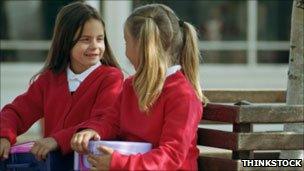One in six pupils streamed aged seven - survey
- Published
- comments

Girls are often put in higher streams than boys at a young age
One in six children is being streamed by ability by the age of seven, according to research by the Institute of Education.
The researchers found boys were more likely to be placed in the bottom stream than girls.
They also found children born in the autumn are statistically more likely to be in the top classes than those with birthdays in spring or summer.
Ethnicity is not linked to stream placement, the researchers suggest.
'Limited movement opportunities'
Professor Susan Hallam, the research project's leader, said: "Given the current emphasis on social mobility it is surprising that so many children are streamed at such a young age.
"We know that once in a stream the opportunities for movement to another stream are limited so life chances are being determined at a very early age."
She drew the distinction between setting - where children in mixed ability classes are grouped for different subjects according to their level in that particular discipline - and streaming, where pupils are placed into different classes on the basis of a judgement about their overall academic ability.
Report author Professor Susan Hallam: "Children and their parents and teachers have lower expectations of those who are in streams"
Prof Hallam described streaming as a "blunt instrument" which she thought had "pretty much died out".
She said it could lower parents', teachers' and children's own expectations, which could then become "self-fulfilling prophesies".
But she did acknowledge it made teaching easier.
Former chief inspector of schools Sir Chris Woodhead said he was surprised and delighted schools were streaming children again.
"It seems to me that streaming is rather a good thing," he told the BBC's Today programme.
"The narrower the spread of abilities in the class, the more effective the teaching can be.
"If you have got children who can hardly read and children reading Lord of the Rings at the top end of primary school, then you have got a very tough job trying to challenge the most able and support the least able."
Child poverty
This Institute of Education report, based on information from 8,875 children, said one in six children in the UK was placed in ability classes by the age of seven.
In Wales, one in five (19.5%) is assigned a stream at an early age while the figure is 17% in England, 16% in Scotland and 11% in Northern Ireland, it said.
Children in larger, mixed-sex, non-faith, non-fee paying schools were more likely to be in streams than pupils in small, independent, single-sex or faith schools, the researchers said.
"Children at schools with mixed-year groups and those attending larger primary schools were more likely to be streamed than their peers in smaller primary schools," says the report.
"Particular groups were found to be over-represented in certain streams. Children in the bottom stream had experienced more consistent poverty and were more likely to have behavioural problems and mothers with fewer qualifications," it added.
"Girls were over-represented in the middle streams, boys in the bottom stream. Autumn-born children were over-represented in the top stream, summer-born in the middle and bottom streams."
The children are included in the Millennium Cohort Study, which is managed by the Centre for Longitudinal Studies at the Institute of Education.
A more extensive analysis of the data will be presented to the British Educational Research Association Conference in September.
- Published21 January 2011
- Published14 November 2010